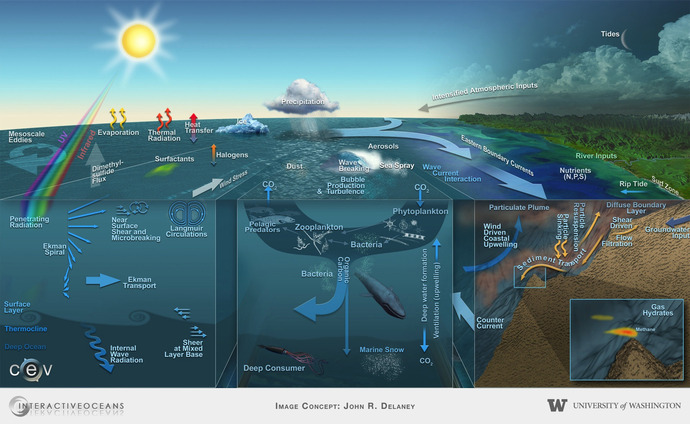The global ocean is the largest, most complex, and unexplored habitat for life on Earth
The global ocean covers 70 percent of the planetary surface and is the largest, most complex and most unexplored habitat for life on Earth. The diversity of life within this dynamic ecosystem is extraordinary, though not yet well quantified. Life thrives kilometers deep within the seafloor, around submarine hot springs that reach temperatures in excess of 400°C, at subzero temperatures within ice, and throughout the entire water column to depths of 11,000 m (36,089 feet). Marine organisms help regulate the Earth's climate, providing nearly 50% of the oxygen to its atmosphere and many tons of protein for human consumption. Yet, few, if any areas in the oceans remain unaffected by human activities. The ocean is the ultimate repository of human waste and it has absorbed nearly half of the fossil carbon released since the onset of the Industrial Revolution. The oceans have been heavily fished for decades, with counts of predatory fish down by 90 percent since the 1950’s.
As human populations grow, and increasing stresses are placed on all ecosystems, it will be critical to understand the extremely complex feedback loops that regulate the oceans, and the time and space scales over which they operate. Deep understanding of this support system requires entirely novel research approaches that will allow the broad spectrum of interactive ocean processes to be studied simultaneously by many different scientists using approaches that enable perpetual cross examination of linkages among and between all processes in a coherent time and space framework. Only through this process can we best mitigate and manage human impacts on the oceans. Ocean observatories have the capability to begin to meet these grand challenges by examining in real-time linkages among ocean dynamics, climate and ecosystem responses throughout the entire water column at the local to basin scale. These powerful new approaches are the challenge and the vision of next generation Ocean Science.
Ecosystem Dynamics: Habitat Characterization at the Ecosystem Level







